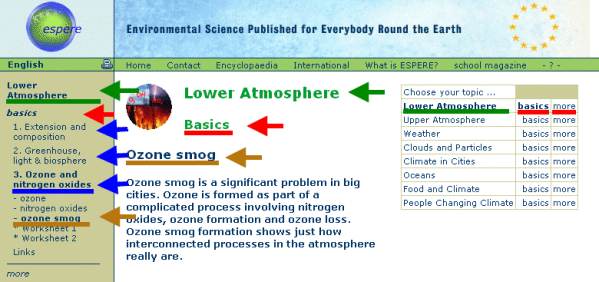 Introduction Introduction
The Article "research" in the ACCENT school magazine Nr. 8 (2006) describes the formation of ozone in the air close to the ground as a consequence of certain concentrations of nitrogen oxides in the atmosphere. The article "context" explains the most important branches of the nitrogen cycle. Nitrogen is found not only as the main component of our air, but also in smaller concentrations in many of its chemical compounds, either oxidised or reduced, in the atmosphere, in soils and in the biosphere. With the help of the following WebQuest you will get an overview of the nitrogen cycle and its importance in particular in the atmosphere and for the climate system.
 Tasks and Objectives Tasks and Objectives
Use this WebQuest in order to study the sulphur cycle. Your work will not be limited to the Internet. Experiments and experiment protocols are also required.
Not all parts of the nitrogen cycle will have the same weight. In some cases basic knowledge is sufficient, in some cases you will deepen your studies of certain compounds and the respective theory. In some cases you will recognize that the nitrogen cycle cannot be regarded as isolated from other chemical compounds. Please briefly summarise during your work also processes related to nitrogen compounds in the air.
 Procedure Procedure
Please follow the order of tasks for the processing of topics which is given in the part "sources".
For the ESPERE pages, a forum is available (which can be used in the English and German branch). You can use it to answer your questions among each other or upon request also ask questions in the English language to the project tutor Elmar Uherek. If you don't understand something (either in the ACCENT school magazine or on the ESPERE pages) you may make respective comments and suggest improvements.
=> to the English Forum - e-mail of Elmar Uherek: 
In order to access the topics and tasks, please do the following:
- Please read first which topic and which worksheets you should edit (information in "sources")
- Please click the link (or type it into the address field of your browser) and you access the website of the main topic (for example: Lower Atmosphere).
- On the left you can see now by the level marked in bold if you are in the basics level or in the advanced level (more). Below the units will be shown (for example: extension & composition; greenhouse, light & biosphere; ozone and nitrogen oxides). Please choose the respective unit.
- Each unit has again texts and worksheets (Ozone, nitrogen oxides ,ozone smog, worksheet 1, ...) Click on the title in the bar on the left in order to access the material you will work with. So you can go from one task to the next.
Most of the issues you need to work on are based on the ESPERE encyclopaedia. But there are also some other sources.
 Sources Sources
If you click here in the online version on the links below, they will open in a new window and this page remains open all the time.
I) Nitrogen oxides and boundary layer ozone:
http://www.atmosphere.mpg.de/enid/239.html
Please cover all texts from Unit 3 in Basics as well as the following text:
http://www.atmosphere.mpg.de/enid/3tc.html
II) Nitrous oxide and ozone hole:
http://www.atmosphere.mpg.de/enid/207.html
Please cover the full Unit 2 in More as well as the worksheets.
http://nobelprize.org/chemistry/laureates/1995/press.html
Discuss the role of nitrogen compounds in the ozone depletion taking place in the stratosphere.
http://www.atmosphere.mpg.de/enid/3tf.html
Compare the difference between N2O and NO2 (see: Sources I) Nitrogen oxides and boundary layer ozone) with respect to their distribution in the atmosphere in time and space.
III) Nitrogen fertilisation and eutrophication:
http://hollandimac.chem.rochester.edu/n2cycle.pdf
http://www.atmosphere.mpg.de/enid/1ve.html
Cover the texts of Unit 2 (not the worksheets) and discuss the impact of nitrogen fertilization on the marine food web.
IV) Ammonia, ammonia salts and particles
http://www.ext.vt.edu/pubs/bse/442-110/442-110.html
http://www.atmosphere.mpg.de/enid/294.html
Please cover Unit 2 about particles in the climate system apart from the article "particles in the respiratory tract" and worksheet 2. How is particle formation related to the nitrogen cycle?
V) Nitric acid, deposition and acid rain:
Work with the following texts:
http://www.atmosphere.mpg.de/enid/3v8.html
http://www.atmosphere.mpg.de/enid/3v9.html
http://www.atmosphere.mpg.de/enid/3vp.html
http://www.ns.ec.gc.ca/msc/as/acidfaq.html
VI) Nitrate radicals and short living compounds
Inform yourself about nitrate radicals and their role in the self-cleaning of the atmosphere in the night. Test your knowledge in an online quiz:
http://www.atmosphere.mpg.de/enid/24z.html
http://www.atmosphere.mpg.de/enid/3z6.html
|
 > ACCENT en > Nr 8 April 2006 Ozone & N2 cycle > A: Activities > WebQuest
> ACCENT en > Nr 8 April 2006 Ozone & N2 cycle > A: Activities > WebQuest

 Basics (Level I)
Basics (Level I)